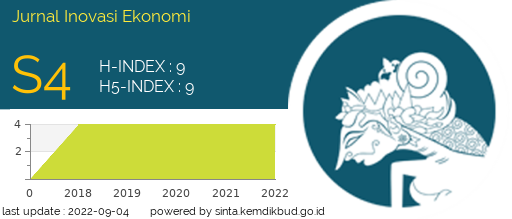What (why) does factor influence fraud tendency in public sector?
DOI:
https://doi.org/10.22219/jiko.v5i03.9894Keywords:
Fraud tendency, internal control, compliance, unethical behaviorAbstract
The purpose of this study is to prove that internal control, compliance in accounting rules, and unethical behavior are factors that influence fraud tendency. The city that has never been awarded the unqualified since 2013-2018 taken as a sample and used multiple linear regression in the data processing. The results show that internal control, compliance, and unethical behavior have a significant effect on fraud tendency. Internal control and compliance with positive influences in reducing fraud tendency; and unethical behavior with negative impacts. This finding also proves that there is no systematic intention in fraud.
Downloads
References
Ade, A. (2017). Pengaruh ketaatan akuntansi, moralitas dan motivasi terhadap kecenderungan kecurangan akuntansi. Jurnal AKuntansi Fakultas Ekonomi Universitas Negeri Padang.
Baird, J. E., & Zelin Ii, R. C. (2009). An Examination of the Impact of Obedience Pressure on Perceptions of Fraudulent Acts and the Likelihood of Committing Occupational Fraud. Journal of Forensic Studies in Accounting & Business.
Beasley, M. S., Carcello, J. V., Hermanson, D. R., & Lapides, P. D. (2000). Fraudulent financial reporting: Consideration of industry traits and corporate governance mechanisms. Accounting Horizons. https://doi.org/10.2308/acch.2000.14.4.441
Chang, S. I., Yen, D. C., Chang, I. C., & Jan, D. (2014). Internal control framework for a compliant ERP system. Information and Management. https://doi.org/10.1016/j.im.2013.11.002
Cohen, J., Ding, Y., Lesage, C., & Stolowy, H. (2010). Corporate Fraud and Managers’ Behavior: Evidence from the Press. Journal of Business Ethics. https://doi.org/10.1007/s10551-011-0857-2
Coram, P., Ferguson, C., & Moroney, R. (2008). Internal audit, alternative internal audit structures and the level of misappropriation of assets fraud. Accounting and Finance. https://doi.org/10.1111/j.1467-629X.2007.00247.x
Coso, T. C. of S. O. of the T. C. (2013). Internal control - integrated framework: executive summary. New York. https://doi.org/978-1-93735-239-4
Donelson, D. C., Ege, M. S., & McInnis, J. M. (2017). Internal control weaknesses and financial reporting fraud. Auditing. https://doi.org/10.2308/ajpt-51608
Elbahnasawy, N. G. (2014). E-Government, Internet Adoption, and Corruption: An Empirical Investigation. World Development. https://doi.org/10.1016/j.worlddev.2013.12.005
Faguet, J. P. (2014). Decentralization and Governance. World Development. https://doi.org/10.1016/j.worlddev.2013.01.002
Fleischman, G. M., Johnson, E. N., Walker, K. B., & Valentine, S. R. (2019). Ethics Versus Outcomes: Managerial Responses to Incentive-Driven and Goal-Induced Employee Behavior. Journal of Business Ethics. https://doi.org/10.1007/s10551-017-3695-z
Grabner, I., & Moers, F. (2013). Management control as a system or a package? Conceptual and empirical issues. Accounting, Organizations and Society. https://doi.org/10.1016/j.aos.2013.09.002
Heidenheimer, A. I., lohnston, M., & Huntington, S. P. (2019). Modernization and Corruption. In Political Corruption. https://doi.org/10.4324/9781315126647-24
Kusumastuti, N. R., & Meiranto, W. (2012). Analisis Faktor-Faktor Yang Berpengaruh Terhadap Kecenderungan Kecurangan Akuntansi Dengan Perilaku Tidak Etis Sebagai Variabel Intervening. Diponegoro Journal of Accounting.
Kyriacou, A. P., Muinelo-Gallo, L., & Roca-Sagalés, O. (2015). Fiscal decentralization and regional disparities: The importance of good governance. Papers in Regional Science. https://doi.org/10.1111/pirs.12061
Lambsdorff, J. G. (2017). Corruption Perceptions Index 2005. In Global Corruption Report 2006. https://doi.org/10.2307/j.ctt184qq53.61
Lisic, L. L., Silveri, S. D., Song, Y., & Wang, K. (2015). Accounting fraud, auditing, and the role of government sanctions in China. Journal of Business Research. https://doi.org/10.1016/j.jbusres.2014.11.013
Moore, C., Detert, J. R., Klebe Treviño, L., Baker, V. L., & Mayer, D. M. (2012). Why Employees Do Bad Things: Moral Disengagement and Unethical Organizational Behavior. Personnel Psychology. https://doi.org/10.1111/j.1744-6570.2011.01237.x
Murphy, P. R., & Dacin, M. T. (2011). Psychological Pathways to Fraud: Understanding and Preventing Fraud in Organizations. Journal of Business Ethics. https://doi.org/10.1007/s10551-011-0741-0
Power, M. (2013). The apparatus of fraud risk. Accounting, Organizations and Society. https://doi.org/10.1016/j.aos.2012.07.004
Spicer, A. (2009). The normalization of corrupt business practices: Implications for integrative social contracts theory (ISCT). Journal of Business Ethics. https://doi.org/10.1007/s10551-009-0319-2
Wang, S. (2010). A comprehensive survey of data mining-based accounting-fraud detection research. In 2010 International Conference on Intelligent Computation Technology and Automation, ICICTA 2010. https://doi.org/10.1109/ICICTA.2010.831
Wilopo. (2006). Analisis Faktor-faktor yang Berpengaruh Terhadap Kecenderungan Kecurangan Akuntansi: Studi pada Perusahaan Publik dan Badan Usaha Milik Negara di Indonesia. Jurnal Riset Dan Akuntansi Indonesia.









